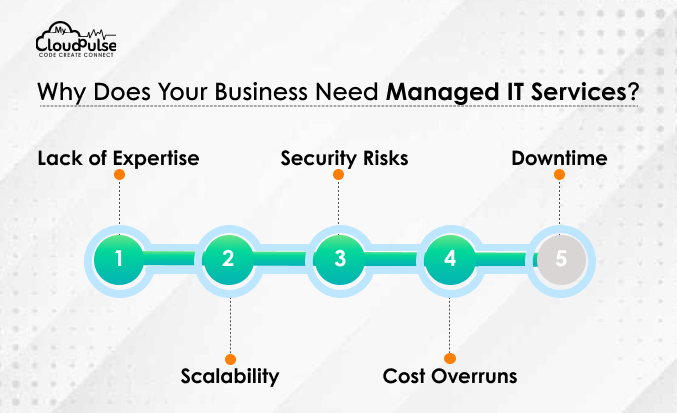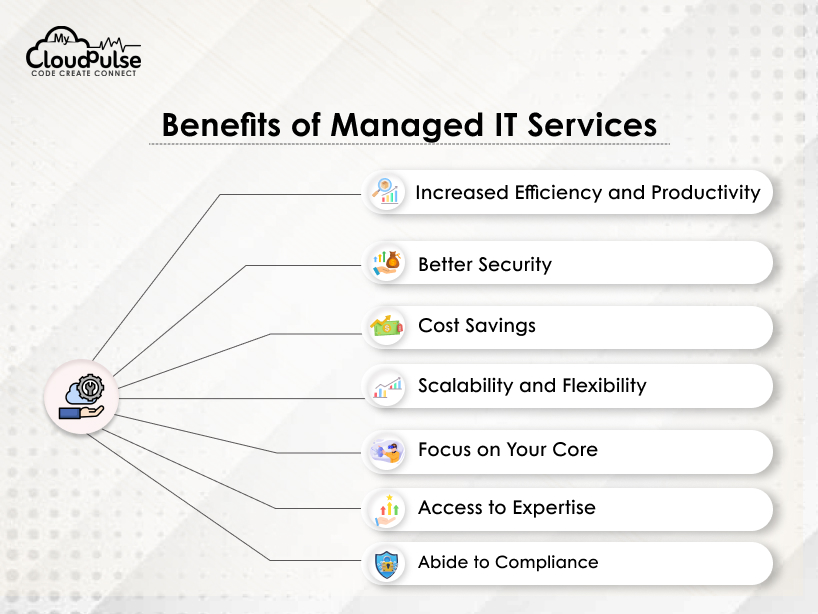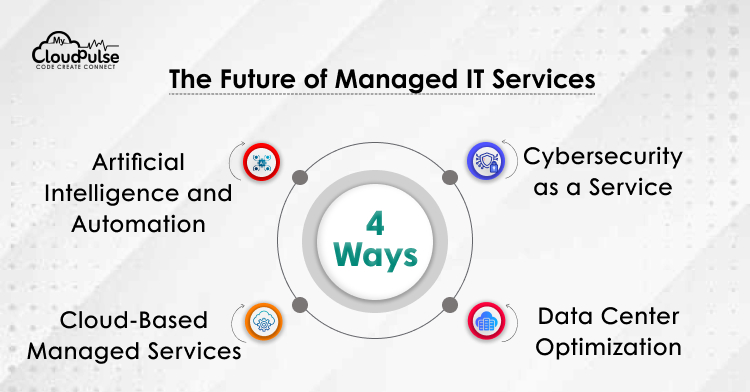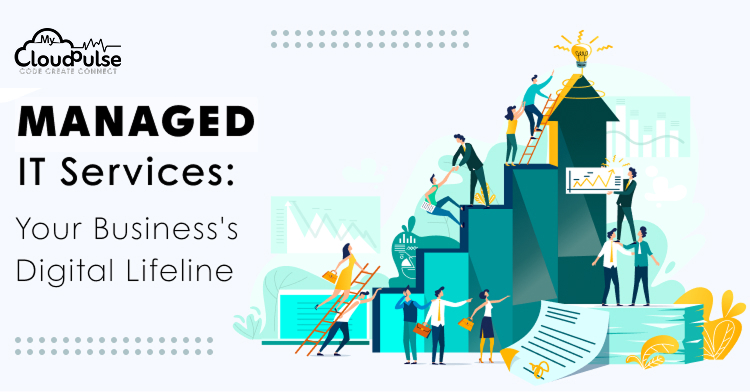Managed IT services are a proactive approach to IT management, addressing these challenges before they become issues. By partnering with a managed IT service provider, you get access to a team of experts who can monitor your IT systems, identify potential problems, and implement solutions to prevent downtime. This proactive approach means optimal performance, minimal downtime, and protection from costly IT failures. These services are a one-stop solution for streamlining your IT and improving security and performance. By handing over your IT to the experts, you can focus on growing your business while we handle the tech.
Without a solid IT foundation, businesses face many challenges. Network outages, cyber threats, system failures, and a lack of IT support can disrupt operations, hinder productivity, and damage a company’s reputation. These can be costly and time-consuming to fix and can result in significant losses.
Managing IT Services and Needs In-House
Managing IT infrastructure in-house is a complex and resource-intensive task. Businesses face many IT challenges that can hinder productivity, increase costs, and expose them to security risks. If your business fails to establish a robust IT infrastructure, it may suffer through several bumps in its functioning that may disrupt operations, hinder productivity, and damage your reputation.
Network outages, cyber threats, system failures, and lack of IT support are just a few of the issues that can arise. These can be costly and time-consuming to fix and can result in significant losses and damage to a company’s reputation.
Why Does Your Business Need Managed IT Services?
In a world of rapid technology change and increasing business complexity, managed IT services are imperative for all organizations. By outsourcing IT infrastructure to experts, businesses can achieve efficiency, security, and cost savings and focus on their core business. The building blocks of managed IT services, including network management, server management, data backup, cybersecurity, cloud services, IT support, and IT consulting, come together to create a robust and resilient IT environment. By addressing the challenges of in-house IT management, such as skills gaps, scalability issues, and security risks, managed IT services allow businesses to thrive in the digital world.

1. Lack of Expertise
Many businesses need help to maintain an in-house IT team with the right expertise to deal with complex technical issues or emerging technologies. As technology moves so fast, it’s hard for organizations to keep up with the latest developments without specialization.
This lack of expertise can lead to inefficient problem-solving, downtime, and missed opportunities. With managed IT services by your side, you get expert assistance round the clock for uninterrupted business operations.
2. Scalability
Matching IT resources to fluctuating business demand is a challenge. Expanding or reducing the IT team to match the workload is costly and time-consuming. Understaffing during peak periods can mean performance issues and customer dissatisfaction, while overstaffing during quiet periods can mean increased costs. Managed IT Solutions eases this with scalable solutions.
3. Security Risks
The ever-changing landscape is a big challenge for businesses. Many businesses suffer cyber threats and ethical attacks with the evolving technology. Protecting sensitive data from cyber-attacks requires specialization, resources, and ongoing monitoring. In-house IT teams need help to keep up with the latest threats and implement adequate security measures.
4. Cost Overruns
Managing IT infrastructure means big upfront and ongoing costs, including hardware, software, maintenance, and personnel. Unforeseen IT costs, equipment failures, or software licensing issues can eat into profit margins and stretch budgets. IT consulting firms can help you save your budget and get access to a lot of services at minimal prices.
5. Downtime
IT issues can take your team’s valuable time and attention away from the core business. Employees can spend too much time troubleshooting technical problems, hindering productivity, and innovation. This can impact customer service, sales, and overall business performance.

What Is Included in Managed IT Services?
Managed IT services include a full suite of IT functions and services to optimize your technology infrastructure and streamline operations. By outsourcing these critical components to a Managed IT service provider, you can focus on your core business and get expert IT management.
1. Network Management
Network management is critical to business uptime. Managed IT services ensure network performance, reliability, and security through continuous monitoring, troubleshooting, and optimization. This includes managing network infrastructure, implementing security, and resolving connectivity issues to reduce downtime and increase productivity.
2. Server Management
Server health and performance are critical to business continuity. Managed IT services manage server tasks, software updates, hardware maintenance, and performance optimization. By proactively managing servers, service providers prevent downtime, improve system reliability, and protect valuable data.
3. Data Backup and Recovery
Data loss can ruin your business. Managed IT services implement robust data protection strategies to protect your critical data. This includes backups, disaster recovery planning, risk mitigating, and testing to ensure data availability and business continuity in case of unexpected events.
4. IT Consulting
IT guidance is critical for businesses wanting to align technology with their overall business goals. Managed IT services provide IT consulting to help you make informed decisions, create IT roadmaps, and optimize your technology investments. By getting expert advice, you can increase operational efficiency and gain an edge.
5. Cybersecurity
Protecting your network and data from cyber threats is at the top of every business’s mind in today’s digital world. Managed IT services provide total cyber security measures, threat detection, prevention, and response. By staying up to date with the latest security trends and best practices, service providers can protect your business from cyber-attacks.
6. IT Support and Help Desk
Efficient IT support is essential for employee productivity. Managed IT services provide comprehensive technical assistance through help desk services, remote troubleshooting, and on-site support. This ensures the timely resolution of IT issues, minimizing downtime and improving user satisfaction.
7. Cloud Services
Cloud technology can be a significant benefit for businesses. Managed IT services help you get the most out of the cloud through migration, management, and optimization. By moving to the cloud, you can scale, reduce costs, and access cloud-based applications.
8. IT Support and Help Desk
Good IT support is critical to employee productivity. Managed IT services provide full technical support through a help desk, remote troubleshooting, and on-site support. This means IT issues are resolved quickly, downtime is minimized, and user satisfaction is maximized.
What Are the Benefits of Managed IT Services?
Managed IT services offer many benefits that can boost a business’s overall performance and competitiveness. By outsourcing IT management to experts, you can streamline, increase efficiency, and reduce risk.
Let’s explore how with a little investment, Managed IT services can help you stay ahead from your competitors.

1. Increased Efficiency and Productivity
To boost your employee productivity and reduce downtime, partner with a great Managed IT service to optimize IT infrastructure and processes. By removing IT bottlenecks and providing fast technical support, managed service providers enable employees to focus on the core business, driving overall efficiency and growth.
2. Better Security
Cybersecurity is a top concern in today’s threat landscape. Managed IT services provide total security measures, threat detection, prevention, and response. By proactively protecting your network and data, you can reduce the risk of data breaches, financial loss, and reputational damage.
3. Cost Savings
Managed IT services can offer services with monthly fees, and there is no large capital expenditure on hardware, software, or IT staff. By bundling IT costs into a single budget, businesses can plan better and allocate resources more effectively.
4. Scalability and Flexibility
Scalability and flexibility are the core of any business. To change your IT needs as your business changes without compromising on IT performance, partner with a trusted managed service provider. Whether you’re growing, downsizing, or launching new projects, managed service providers can scale their services to match your needs so your IT infrastructure supports your evolving requirements.
5. Focus on Your Core
By outsourcing IT management, you can free up internal resources to focus on your core competencies and strategic initiatives. This means you can focus on what you’re good at and innovate while managed service providers handle the IT complexity.
6. Access to Expertise
Your business can have access to the latest solutions, and managed IT service providers have a wealth of IT knowledge and expertise. Their teams are up to date with the latest technology trends and industry best practices, so your business has access to the latest solutions and support.
7. Abide to Compliance
Many businesses need to adhere to industry regulations and standards. Managed IT service providers can help you meet compliance requirements by implementing the proper security measures, data protection practices, and regulatory reporting.
How to Choose a Managed IT Service Provider?
Choosing the right managed IT service provider is a big decision that can make or break your business. To ensure you select the best partner, make sure you evaluate the following:
1. Experience and Expertise
A proven track record of delivering managed IT services is key. Look for a provider with a good reputation and a deep understanding of your industry. Check their experience with similar-sized businesses and the complexity of their IT environments. A provider with industry-specific knowledge can offer customized solutions and better align with your business goals.
2. Service Level Agreements (SLAs)
Clear service level agreements (SLAs) are critical to the quality of service you get. Evaluate the provider’s SLAs to understand their uptime, response times, and resolution times. A well-defined SLA provides a framework to measure performance and hold the provider accountable.
3. Security
Cybersecurity is top-of-mind for businesses. Check the provider’s security practices, certifications, and compliance with industry standards. Ask about their incident response plans, data protection measures, and employee training programs. A strong security posture is critical to protecting your data.

4. Customer Support
Evaluate the quality and responsiveness of the provider’s customer support. Consider factors like availability, response times, communication channels, and problem-solving capabilities. Good support is critical to minimizing downtime and business continuity.
5. Pricing and Contracts
Understand the provider’s pricing structure, contract terms, and any hidden costs. Compare different pricing models, such as fixed fees, usage-based pricing, or bundled packages. Review the contract carefully to understand service levels, termination clauses, and dispute resolution processes.
6. References and Testimonials
Ask for references from other businesses that have used the provider’s services. Read customer reviews and testimonials to gain insight. Contact existing clients to get firsthand information about the provider’s performance, reliability, and customer satisfaction.
Common Challenges and How to Overcome Them
While managed IT services bring many benefits, businesses may face some challenges during implementation and management. By knowing these challenges and taking proactive steps, you can mitigate the risks and get the most out of your managed IT partnership.
a. Vendor Lock-In
One concern is vendor lock-in, which makes it difficult or expensive to switch to another managed IT service provider. To avoid this, evaluate the contract terms, exit strategies, and portability of your data. Consider factors like data ownership, intellectual property, and the ability to transfer services to another provider. We sign an agreement with our clients to ensure there are no violations or problems during the execution of the project.
b. Data Security Concerns
Data security is a top priority. When partnering with a managed IT service provider, you need to do thorough due diligence on their security practices and certifications. Make sure they have robust security measures in place, such as data encryption, access controls, and incident response plans. Regular security audits and transparent communication about data handling procedures are key.
c. Change Management
Moving to a managed IT service model can significantly change employees and business processes. Good change management is key to a smooth transition and minimal disruption. Communicate the benefits of managed IT services, train employees, and address their concerns to get their buy-in and support.
d. Service Level Expectations
Well-defined service level expectations (SLAs) are essential for a successful managed IT partnership. Ensure the provider has clear performance metrics, response times, and uptime guarantees. Monitor and review service delivery against SLAs to hold the provider accountable and ensure they meet your business needs.
The Future of Managed IT Services
The managed IT services landscape is changing fast and is driven by technology and business demands. As technology disrupts industries, managed service providers are adapting their offerings to meet their customers’ changing needs.

1. Artificial Intelligence and Automation
Artificial intelligence (AI) and automation are changing the way IT services are delivered. Managed service providers are using AI-powered tools to optimize IT operations, automate mundane tasks, and improve service delivery. From predictive analytics to intelligent automation, AI is delivering efficiency, cost savings, and better decision-making. Our experts use the best AI algorithms that meet your business needs and integrate them with your solution to ensure your recurring tasks are automated and your team can focus on expanding the business.
2. Cybersecurity as a Service
The increasing complexity of cyber threats requires a strong cybersecurity posture. Managed service providers are expanding their cybersecurity offerings to address business concerns. This includes advanced threat detection, incident response, compliance management, and security awareness training. By delivering cybersecurity as a service, they can help organizations protect their data and mitigate risks. As you partner with our IT firm, we make sure to use the best practices to ensure your data is protected.
3. Cloud-Based Managed Services
Cloud adoption is speeding up the delivery of managed IT services. Cloud-based platforms offer flexibility, scalability, and cost savings. Managed service providers are using cloud technology to deliver a range of services, including infrastructure as a service (IaaS), platform as a service (PaaS), and software as a service (SaaS). This allows businesses to get the benefits of the cloud without the complexity of managing their infrastructure.
Thus, you can limit access to information on the cloud and connect with your business anytime, anywhere, without having to rush to your physical office for little things.
4. Data Center Optimization
Good data center management is critical to reducing costs and improving performance. Managed service providers focus on optimizing data center infrastructure through virtualization, consolidation, and energy efficiency initiatives. By using advanced technology and data analytics, we can help businesses get the most out of their data center assets.
Final Words
As technology changes, the managed IT services landscape is changing fast. Artificial intelligence, automation, and cloud computing are driving innovation and better service delivery. By staying ahead of the curve and choosing a managed IT service provider, you can future-proof your business.
In the end, the decision to go for managed IT services is an investment in your business’s future. By working with a skilled and experienced provider, you can get the most out of technology to drive growth, customer satisfaction, and business goals.
Most Frequently Asked Questions by Our Managed IT Service Providers
Answer: While IT support involves fixing IT issues, managed IT services involve managing your entire IT infrastructure. Managed IT services cover a broader range of services, including network management, cybersecurity, and IT consulting, to optimize your IT and prevent problems from occurring.
If you aren’t sure what is your business requirement is exactly, connect with our experts and they’d help you figure out the right services that align with your business objective.
Answer: If you regularly experience IT issues, struggle to keep up with technology, or have security concerns, managed IT services can help. Outsource if your IT department is overwhelmed, lacks skills, or is holding back your business.
Answer: The cost of managed IT services varies depending on your business size, the complexity of your IT infrastructure, and the services required. Most providers offer bespoke packages. You can discuss your business needs with our team and they ensure your business needs are met at the most reasonable prices.


